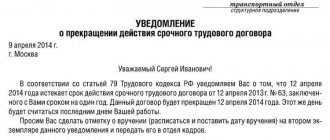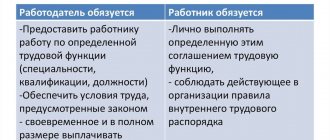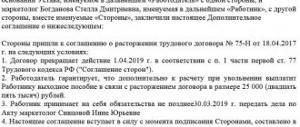Legal encyclopedia of MIP online - » Labor disputes » Useful articles on employment contracts » Termination of an employment contract due to circumstances beyond the will of the parties
Get an expert opinion on circumstances beyond the control of the parties in two clicks
If it is not possible to transfer the employee to another place, the employment contract is terminated.
Termination of an employment contract with an employee due to his conscription for military service
Males who are eighteen years old and up to twenty-seven years of age are subject to conscription for military service in the ranks of the Russian armed forces. Persons released for medical reasons, as well as those who are given a deferment, are not called up for service.
People who, for religious reasons, cannot take up arms, are also not subject to conscription for military service. Instead of serving in the armed forces, they are given the opportunity to repay their debt to their homeland by serving in civil service in such cases.
The labor obligations of the employer and the employee called up for service are terminated for reasons that do not depend on them, in accordance with part one of paragraph 1 of Article 83 of the Labor Code of Russia.
Upon receipt of a summons for conscription, a letter of resignation from the employee is not required. A summons can be received both at the residence address of a person being drafted into the army or civil service, and at the place of his last work.
In cases where a summons arrives at the address of the enterprise where the conscript works, it is necessary to inform the employee that he is being called up for service no later than three days from the date specified in the summons.
If the enterprise received a summons late, as evidenced by a postal notification or stamp, the manager will not bear responsibility for the delay in notifying the conscript.
The summons must be handed over against the signature of the employee who is called up for service. If he refuses to sign, it is necessary to draw up an act signed by several witnesses stating that the conscript has been familiarized with and refused to sign.
The part of the summons from the military registration and enlistment office that is cut off (tear-off coupon) indicating the date of notification must be sent back to the military registration and enlistment office. If it is impossible to notify an employee of the enterprise, if he is sick or on a business trip, he will be familiarized with the summons upon return. It is also necessary to inform the military registration and enlistment office about this.
In such cases, the employee is usually dismissed the day before he needs to appear at the time specified in the summons to be sent to serve his duty station. The order states that the basis for dismissal is conscription into military service or assignment to civilian service.
They also indicate the number and date of the summons from the military registration and enlistment office to justify the dismissal. A corresponding entry is made in the work book.
On the last day of work, a work book is issued and a full payment is made to the recruited employee. If necessary, compensation is paid for unused vacation days, wages for time actually worked and benefits in the amount of two weeks' earnings.
There are times when dismissal occurs after actual conscription into the army. In the current situation, the order makes a note that it is not possible to acquaint the person with a personal signature. A written request is sent to obtain permission to send documents by mail. The settlement money is transferred to the conscript's bank salary card.
Article 83 of the Labor Code of the Russian Federation. Termination of an employment contract due to circumstances beyond the control of the parties
1. Article 83 of the Labor Code of the Russian Federation defines a list of circumstances, the occurrence of which entails the termination of an employment contract regardless of the will of the parties.
These include:
- 1) conscription of workers for military service or sending them to alternative civil service replacing it, carried out in accordance with the Law on Military Duty and Federal Law of July 25, 2002 N 113-FZ “On Alternative Civil Service” (SZ RF. 2002. N 30. Art. 3030).
Male citizens aged 18 to 27 years who are or are required to be registered with the military and are not in the reserves are subject to conscription for military service.
The conscription of citizens for military service is carried out on the basis of decrees of the President of the Russian Federation. The decision to conscript for military service can be made only after citizens reach 18 years of age.
Citizens who are not in the reserves are called up for military service 2 times a year: from April 1 to July 15 and from October 1 to December 31 on the basis of decrees of the President of the Russian Federation, with the following exceptions:
- a) citizens living in certain regions of the Far North and certain localities equated to regions of the Far North, the list of which is determined by the General Staff of the Armed Forces of the Russian Federation, are called up for military service from May 1 to July 15 and from November 1 to December 31;
- c) citizens who are teaching staff of educational institutions - from May 1 to July 15.
b) citizens living in rural areas and directly involved in sowing and harvesting work are called up for military service from October 15 to December 31;
Male citizens aged 18 to 27 years who are not in the reserves, have the right to replace conscript military service with an alternative civil service, and have personally submitted an application to the military commissariat about their desire to replace conscript military service with an alternative civilian service are sent to alternative civil service. and in respect of which the draft commission of a district, a city without district division, or another municipal (administrative-territorial) entity has made a corresponding decision (Article 3 of the Federal Law “On Alternative Civil Service”).
The basis for termination of an employment contract with an employee called up for military service is a summons from the military commissariat to appear at a recruiting station to be sent to the place of military service, and for those sent to alternative civilian service - an order from the military commissariat to leave for the place of alternative civil service (Regulations on conscription of citizens of the Russian Federation for military service, approved by Decree of the Government of the Russian Federation of November 11, 2006 N 663 // SZ RF. 2006. N 47. Article 4894; Article 14 of the Federal Law “On Alternative Civil Service”).
Upon termination of an employment contract with an employee in connection with his conscription into military service or assignment to an alternative civilian service replacing it, he is paid severance pay in the amount of 2 weeks of average earnings (Part 3 of Article 178 of the Labor Code of the Russian Federation);
In the absence of a decision from the state labor inspectorate or the court on the reinstatement of a previously dismissed employee, the employee occupying his workplace (position) cannot be dismissed under clause 2 of part 1 of Art. 83 Labor Code of the Russian Federation. Thus, an employee hired to replace an employee who was dismissed and reinstated to his previous place of work by decision of the employer cannot be dismissed.
It is also impossible to dismiss on this basis an employee hired in place of a person called up for military service, but subsequently released from service and returning to work in the same organization, unless the issue of his reinstatement to his previous job is decided by the court or the state labor inspectorate.
To an employee who is subject to dismissal from work in connection with the reinstatement of an employee who previously performed it to this job, the employer is obliged, in accordance with Part 2 of this article, to offer another job available in the organization. And only if the employer does not have the opportunity to transfer the employee to another job or the employee refuses the transfer, termination of the employment contract under clause 2, part 1 will be legal.
When employees are dismissed on the basis of clause 2, part 1, article 83 of the Labor Code of the Russian Federation, they are paid severance pay in the amount of 2 weeks of average earnings (part 3, article 178 of the Labor Code);
Failure to elect an employee to a position for a new term will be a legal basis for terminating an employment contract with him, provided that the elections (non-election) or competition were held in strict accordance with the conditions and procedure for holding elections (competition) established by law, other regulatory legal act or charter organizations;
If a penalty is applied to a person that does not exclude the possibility of continuing his previous work, he cannot be dismissed under clause 4 of part 1 of the commented article;
When dismissing employees recognized as completely incapable of working (clause 5, part 1, article 83 of the Labor Code of the Russian Federation), they are paid severance pay in the amount of 2 weeks of average earnings (part 3 of article 178 of the Labor Code of the Russian Federation);
The recognition of an employee or employer - an individual as deceased or missing is carried out by the court in accordance with the Civil Code.
According to Art. 45 of the Civil Code, a citizen can be declared dead if at his place of residence there is no information about his place of stay for 5 years, and if he went missing under circumstances threatening death or giving reason to assume his death from a certain event - within 6 months .
The day of death of a citizen declared dead is the day the court decision to declare him dead comes into force. If a citizen who has gone missing under circumstances threatening death or giving reason to assume his death from a certain accident is declared dead, the court may recognize the day of death of this citizen as the day of his alleged death.
In accordance with Art. 42 of the Civil Code, at the request of interested parties, a citizen may be recognized by the court as missing if during the year there is no information about his place of residence at his place of residence.
A special procedure has been established to consider requests to recognize a citizen as missing or declare him dead. It consists in the fact that the person who made the corresponding demand must explain for what purpose he needs such recognition. For example, an employee requests that an employer, an individual, be declared missing in order to terminate an employment contract with him and receive unpaid wages. Or the employer puts forward this requirement in relation to an employee with whom, until he is declared missing, he cannot terminate the employment contract.
A person who applies for recognition of a citizen as missing or deceased must also prove not only the absence of information about him, but also that it is impossible to establish the location of the absent person;
The powers of the Government of the Russian Federation and public authorities of the constituent entities of the Russian Federation in this area are determined by the Federal Law of December 21, 1994 N 68-FZ “On the protection of the population and territories from natural and man-made emergencies” (SZ RF. 1994. N 35. Art. 3648).
In accordance with the said Law, the Government of the Russian Federation, on the basis of and in pursuance of the Constitution of the Russian Federation, federal laws and regulations of the President of the Russian Federation, issues regulations and orders in the field of protecting the population and territories from emergency situations and ensures their implementation (Article 10). State authorities of the constituent entities of the Russian Federation, in accordance with federal laws, adopt laws and other regulatory legal acts in the field of protecting the population and territories from emergency situations of an intermunicipal and regional nature (Article 11).
An emergency is a situation in a certain territory that has arisen as a result of an accident, a dangerous natural phenomenon, a catastrophe, a natural or other disaster that may result or has resulted in human casualties, damage to human health or the environment, significant material losses and disruption of people’s living conditions (Article 1).
To establish a unified approach to assessing emergency situations of a natural and man-made nature, determining the boundaries of emergency zones and adequately responding to them, Decree of the Government of the Russian Federation of May 21, 2007 N 304 is applied (in accordance with the Federal Law “On the Protection of the Population and Territories from Emergency Situations natural and man-made"), the Regulations on the classification of emergency situations of natural and man-made nature were approved (SZ RF. 2007. N 22. Art. 2640).
It should be borne in mind that in emergency situations in accordance with Art. 56 and Art. 88 of the Constitution of the Russian Federation, under the circumstances and in the manner provided for by the Law on a State of Emergency, a state of emergency may be introduced on the territory of the Russian Federation or in its individual localities. A state of emergency throughout the Russian Federation or in its individual localities is introduced by decree of the President of the Russian Federation with immediate notification of this to the Federation Council and the State Duma.
A state of emergency is introduced only in the presence of circumstances that pose a direct threat to the life and safety of citizens or the constitutional system of the Russian Federation and the elimination of which is impossible without the use of emergency measures. Such circumstances include:
- a) attempts to forcibly change the constitutional system of the Russian Federation, seize or usurp power, armed rebellion, riots, terrorist acts, blocking or seizure of particularly important objects or certain areas, preparation and activities of illegal armed groups, interethnic, interfaith and regional conflicts accompanied by violent actions , creating a direct threat to the life and safety of citizens, the normal activities of state authorities and local governments;
b) natural and man-made emergencies, environmental emergencies, incl. epidemics and epizootics that arose as a result of accidents, hazardous natural phenomena, catastrophes, natural and other disasters, resulting (may result) in human casualties, damage to human health and the environment, significant material losses and disruption of living conditions of the population and requiring large-scale emergency response -rescue and other urgent work (Article 3 of the Law on the State of Emergency);
 disqualification or other administrative punishment may be grounds for termination of an employment contract, provided that this punishment precludes the employee from fulfilling his duties under the employment contract.
disqualification or other administrative punishment may be grounds for termination of an employment contract, provided that this punishment precludes the employee from fulfilling his duties under the employment contract.So, for example, if an administrative punishment is applied to an employee in the form of a warning (Article 3.4 of the Administrative Code) or a fine (Article 3.5 of the Administrative Code), then he cannot be dismissed on the basis of clause 8 of Part 1 of Art. 83 Labor Code of the Russian Federation, because such administrative penalties do not prevent the employee from fulfilling his duties under the employment contract.
At the same time, the disqualification of an employee excludes the possibility of him performing the work provided for in the employment contract, because disqualification as a type of administrative punishment applies to employees holding leadership positions in the executive body of a legal entity, carrying out organizational, administrative or administrative functions in a body of a legal entity, to members of the board of directors, as well as to persons engaged in business activities without forming a legal entity , incl. to arbitration managers carrying out business activities to manage a legal entity, as well as management of a legal entity in other cases provided for by the legislation of the Russian Federation (Article 3.11 of the Administrative Code), and the essence of disqualification is to deprive the employee of the right to occupy the specified positions or perform the specified functions.
Administrative punishment in the form of disqualification is imposed by a judge and is set for a period of 6 months to 3 years.
Termination of an employment contract with a disqualified employee on the basis of clause 8, part 1, art. 83 of the Labor Code of the Russian Federation is possible regardless of how long the employee is disqualified. At the same time, it should be taken into account that in accordance with part 2 of the commented article, dismissal of an employee on this basis is permitted if it is impossible to transfer the employee with his written consent to another job available to the employer (see paragraph 3 of the commentary).
Decree of the Government of the Russian Federation of November 11, 2002 N 805 approved the Regulations on the formation and maintenance of a register of disqualified persons (SZ RF. 2002. N 46. Art. 4584), which determines the procedure for the formation and maintenance of a register of persons disqualified in accordance with the Code of Administrative Offenses.
The register of disqualified persons is formed and maintained by the Ministry of Internal Affairs of the Russian Federation (hereinafter referred to respectively as the register, an authorized federal body) and the ministries of internal affairs, departments (main departments) of internal affairs of the constituent entities of the Russian Federation in order to ensure registration of persons disqualified on the basis of court decisions on disqualification, as well as to provide interested parties with information about disqualified persons.
Copies of these decisions are sent by the courts that issued them to the Ministry of Internal Affairs of the Russian Federation, the Ministry of Internal Affairs, the department (main department) of internal affairs of the corresponding subject of the Russian Federation at the place where the decision was issued.
The information contained in the register is public.
The form of an extract from the register containing information about a specific disqualified person and provided to interested parties, as well as the procedure for its provision, are established by the authorized federal body.
Requests for information contained in the register are recorded in the register indicating the person who made the request, the date of the request and the date the information was provided.
The deadline for providing information contained in the register is 5 days from the date the authorized federal body receives the relevant request.
The authorized federal body, within 10 days from the date of entering information about a disqualified person into the register, sends information about him to those federal executive authorities whose officials, in accordance with the Code, have drawn up protocols on administrative offenses providing for punishment in the form of disqualification.
Removal from the register of disqualified persons is carried out:
- upon expiration of the period of disqualification;
in pursuance of the judicial act that has entered into force on the cancellation of the disqualification order, a certified copy of which was received by the authorized federal executive body responsible for the formation and maintenance of the register of disqualified persons, from the court or from a previously disqualified person as part of an appendix to the application for exclusion from the register of disqualified persons ;
Termination of an employment contract on this basis is legal if the following conditions are met:
- a) if the expiration, suspension of validity for a period of more than two months or deprivation of the employee’s special right entails the impossibility of the employee fulfilling his duties under the employment contract;
b) if it is impossible to transfer the employee with his written consent to another job available to the employer (both a vacant position or work corresponding to the employee’s qualifications, and a vacant lower position or lower paid job), which the employee can perform taking into account his state of health.
It should be borne in mind that the employer has the right to terminate the employment contract with the employee in connection with the suspension of the employee’s special right only if this right is suspended for a period of more than two months. If this period does not exceed two months, then the employer, in accordance with Art. 76 of the Labor Code must suspend the employee from work for the appropriate period (see commentary to this article);
- if the condition of non-disclosure of state secrets is provided for in the employment contract with the employee;
if the performance of duties for a position held in accordance with the contract involves the use of information constituting a state secret;
In accordance with Art. 22 of the Law on State Secrets, the grounds for refusing an official or citizen access to state secrets may be:
- recognition by the court as incompetent, partially capable or a repeat offender, his being on trial or under investigation for state and other serious crimes, his unexpunged criminal record for these crimes;
- the presence of medical contraindications for working with the use of information constituting state secrets, according to the list approved by the federal executive body authorized in the field of healthcare and social development;
- permanent residence of himself and (or) his close relatives abroad and (or) execution by these persons of documents for departure for permanent residence in other states;
- identification, as a result of verification activities, of actions of the person being processed that create a threat to the security of the Russian Federation;
- his evasion from verification activities and (or) provision of knowingly false personal data to him.
The access of an official or citizen to state secrets may be terminated by decision of the head of a government body or organization in the following cases:
- termination of an employment agreement (contract) with him in connection with organizational and (or) staffing activities;
- a one-time violation of his obligations under the employment agreement (contract) related to the protection of state secrets;
- the occurrence of circumstances that are, according to Art. 22 of the said Law is a basis for denying an official or citizen access to state secrets.
- The decision of the head of the organization to terminate the employee’s access to state secrets and to terminate the employment contract with him on the basis of this may be appealed to a higher organization or to the court.
Termination of access to state secrets does not relieve the employee of his obligations to not disclose information constituting a state secret.
In accordance with part 2 of the commented article, termination of an employment contract under clause 10 of part 1 of article 83 of the Labor Code of the Russian Federation is not allowed if the employer has the opportunity to transfer the employee with his consent to another job (see clause 3 of the commentary);
The addition introduced by Federal Law No. 90-FZ of June 30, 2006 gives the employer the right to terminate an employment contract with an employee who was unlawfully reinstated, regardless of how long the employee worked after reinstatement. At the same time, the employer is not obliged to offer the dismissed employee other available vacant positions. However, he has the right to do this if he considers it necessary;
An employment contract on this basis is terminated no later than the end of the period established by the Government of the Russian Federation for bringing employers carrying out certain types of economic activities on the territory of the Russian Federation the total number of employees who are foreign citizens or stateless persons in accordance with the permissible share of such employees.
The Government of the Russian Federation annually determines the need to attract foreign workers, incl. by priority professional and qualification groups, taking into account the political, economic, social and demographic situation, as well as in order to assess the effectiveness of the use of foreign labor.
The executive bodies of state power of a constituent entity of the Russian Federation annually determine the need to attract foreign workers, evaluate the effectiveness of the use of foreign labor, and the contribution of foreign workers to the socio-economic development of a given constituent entity of the Russian Federation. Determination by government authorities of a constituent entity of the Russian Federation of the need to attract foreign workers is carried out in accordance with the rules established by the federal executive body authorized by the Government of the Russian Federation.
In order to ensure national security, maintain an optimal balance of labor resources, promote, as a matter of priority, the employment of citizens of the Russian Federation, as well as in order to solve other problems of the internal and foreign policy of the state, the Government of the Russian Federation has the right to establish quotas for issuing work permits to foreign citizens both in the territory of one or more subjects of the Russian Federation, and throughout the Russian Federation.
Quotas provided for in paragraph 4 of Art. 18.1 of the Law on the Legal Status of Foreign Citizens, can be established depending on the profession, specialty, qualifications of foreign citizens, their country of origin, as well as depending on other economic and (or) social criteria, taking into account the regional characteristics of the labor market. These quotas do not apply to foreign citizens - qualified specialists who are employed in their existing profession (specialty) in accordance with the list of professions (specialties, positions) approved by the federal executive body exercising the functions of developing state policy and legal regulation of employment. , in agreement with the federal executive body exercising the functions of developing state policy and legal regulation in the field of socio-economic development and trade.
The Government of the Russian Federation has the right annually, taking into account the regional characteristics of the labor market and the need to prioritize the employment of citizens of the Russian Federation, to establish the permissible share of foreign workers used in various sectors of the economy by business entities operating both in the territory of one or more constituent entities of the Russian Federation, and throughout the entire territory of the Russian Federation.
When establishing the specified permissible share, the Government of the Russian Federation determines the period for bringing the number of foreign workers they employ in accordance with it by economic entities. This period is established taking into account the need for employers to comply with the procedure for terminating an employment agreement (contract) established by the labor legislation of the Russian Federation (Article 18.1 of the Law on the Legal Status of Foreign Citizens).
3. In accordance with Part 2 of Article 83 of the Labor Code of the Russian Federation, termination of an employment contract on the grounds provided for in paragraphs 2, 8, 9 or 10 of Part 1 of this article is allowed if it is impossible to transfer the employee with his written consent to another available the employer's work (both a vacant position or work corresponding to the employee's qualifications, and a vacant lower position or lower-paid work), which the employee can perform taking into account his state of health. In this case, the employer is obliged to offer the employee all vacancies available in the given area that meet the specified requirements. The employer is obliged to offer vacancies in other localities if this is provided for by the collective agreement, agreements, or employment contract. In other words, the employer is obliged in this situation to offer the employee appropriate vacancies not only directly in the organization in which the employee is employed, but also in its structural divisions, if they are located in the same area. If there are vacancies in structural units located in other locations (for example, in a branch or representative office of an organization), the employer is obliged to offer them if this is provided for in the collective agreement, agreements, or employment contract.
If the employer does not have the appropriate work, as well as if the employee refuses another job offered to him, the employment contract with him is terminated with reference to the appropriate grounds provided for in this article.
Termination of a contract with an employee who replaced a temporarily absent employee
According to the law, an employee can be transferred to another place of work to replace an absent employee with his consent or, if necessary, without consent for a period of up to one month (the first and second parts of Article 72.2 of the Labor Code).
Transfer to work in place of an absent employee is usually associated with production needs. Most often it is drawn up by agreement of the parties.
The last day of transfer work is the day before the absent employee goes to work.
In cases where an employee has been transferred from his main place of work, he retains his previous job. When the absent employee he was replacing leaves, he returns to his place of work.
The peculiarity of replacing an absent employee is that it is impossible to terminate the employment relationship early until the truly absent employee returns to work.
Based on the first part of Article 59 of the Labor Code, it is possible to conclude a fixed-term contract during the absence of an employee, who retains a place of work with a person who does not work at this enterprise (institution). This is often practiced while an employee is on maternity leave. In this case, when the employee returns from maternity leave, the person hired under the contract will be fired.
Basic provisions
The law provides for various grounds for terminating the relationship between an employer and an employee. Basically, this is the personal desire of the employee. Every person has the right to resign of his own choice. In some cases, the employer may be forced to do this. Article 83 of the Labor Code of the Russian Federation provides for the termination of an employment contract due to circumstances beyond the control of the parties. In other words, external reasons force a person to leave his job.
This applies to persons of military age. They may be sent to military or alternative service. The second paragraph of the article provides for reinstatement by decision of the court or labor inspectorate.
Some positions can be held for a certain period of time. The candidate is selected through a competition. It is carried out for the vacancy:
- in the civil service;
- in universities;
- to the Ministry of Defense.
Accordingly, if a person does not pass the competition again, the employment contract with him is terminated.
The conviction of the employee is considered a circumstance beyond his control. If he is serving a sentence in prison , then he is fired from his job. At the end of his term, he will not be able to occupy certain places. Thus, previously convicted persons cannot work in government agencies.
Disqualification or administrative punishment and termination of the employment contract
For various administrative offenses provided for by the law of the Russian Federation, a person can be disqualified, deprived of the right to conduct certain activities, hold any positions for a certain period, or a person without a fixed place of residence, a foreigner, can be expelled from the Russian Federation.
Dismissal due to administrative punishment or disqualification of an employee occurs on the basis of Article 83 of the first part of paragraph 8 according to the norms provided for in paragraph 9 of the same article of the Labor Code of Russia.
An employee can be dismissed only by a court verdict, indicating in the order the date of the verdict and the number of the case in which the court hearing was held.
As in all cases of dismissal, the employee must be familiarized with the order against signature. In case of refusal to sign, a corresponding act is drawn up. On the day of dismissal, the former employee is given a work book and full cash payment.
Author of the article
Other points
Regardless of a person’s health status, an employer can dismiss an employee if he is declared incapable of performing his duties. This conclusion is given by the medical commission.
The death of an employee or his recognition as missing is also considered grounds for termination of the relationship.
The Government of the Russian Federation, if necessary, can declare a State of Emergency due to natural or man-made disasters. This also serves as an obstacle to fulfilling duties.
The contract can be suspended under the following circumstances:
- expired license term;
- deprivation of rights;
- expiration of the certificate.
In paragraph 10 of Art.
83 of the Labor Code of the Russian Federation provides for dismissal due to denial of access to the state. secret. This can happen for various reasons. Recognition by a court of a person as a repeat offender or incompetent, dual citizenship, false information in the application form - all this gives the right to terminate admission. The court can not only reinstate, but also declare such a decision illegal. This is provided for in paragraph 11 of the article. In particular, this applies to the actions of lower authorities.
In clause 13, part 1, art. 83 of the Labor Code of the Russian Federation indicates restrictions on the performance of certain duties. According to it, the employer is obliged to provide the employee with any position taking into account his health capabilities.
Who is recognized as completely disabled and how?
As mentioned above, a person can only be declared disabled by a medical commission after conducting a full examination and recording this in the documents. In order for the employee to receive all the benefits due to him in the future, he must have such documents in hand. These include:
- certificate of disability;
- a certificate of temporary incapacity for work, which also indicates information about disability.
These same documents are the basis for dismissal under Article 83, paragraph 5.
Dismissal benefits under clause 5 of Article 83 are paid in the amount of two weeks’ average earnings
Doctors indicate the degree of working ability of the examined patient as a percentage, and also draw conclusions about his condition, the need for medical care, and the like. Conclusions about whether a person is capable of continuing to work in the same place and with the same impact are made on the basis of classifications and criteria used in the implementation of medical and social examination of citizens by federal state institutions for medical and social examination of citizens (approved by Order No. 1013 of the Ministry of Health and Social Development of Russia dated December 23, 2009). According to the standards, an employee is considered to have completely lost his ability to work if he is assigned the first or second disability group.
Question
The employee was hired instead of the main employee (maternity leave). Now she also plans to go on maternity leave. Will this employee have access to maternity and infant benefits?
Lawyer's response:
In this case, the following situations are possible. Situation No. 1. On the expiration date of the fixed-term employment contract, the temporary employee is pregnant. In this case, a temporary worker can be dismissed only if the following conditions are simultaneously met: a fixed-term employment contract has been drawn up with her for the period of absence of the main employee due to the birth of a child; the company does not have a suitable vacancy for the transfer of a pregnant temporary worker (Article 261 of the Labor Code of the Russian Federation). Situation No. 2. A regular fixed-term contract was concluded with the temporary worker, however, before it was terminated, it turned out that the worker was pregnant. In this case, the contract is subject to extension on the basis of medical documents and a written application from the temporary worker until the end of her pregnancy.
Dismissal benefits under clause 5 of Article 83 of the Labor Code of the Russian Federation
Since with the loss of working capacity a person also loses the ability to provide for himself, the state provides him with benefits and allowances so that he can at least somehow exist. Therefore, upon dismissal, in addition to the salary due to him for the period worked and compensation for unused vacation days, the employee also receives severance pay. Its size is two weeks' average earnings.
To calculate the average amount, you need to add together all payments for the last year, issued to the employee, and divide them by the number of days actually worked in a given year - you get the average daily earnings, on which the two-week allowance is calculated.







